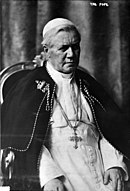Papal conclave, 1903

Coat of arms during the vacancy of the Holy See
|
|
| Dates and location | |
|---|---|
| 31 July – 4 August 1903 Sistine Chapel, Apostolic Palace, Rome |
|
| Key officials | |
| Dean | Luigi Oreglia di Santo Stefano |
| Sub-Dean | Serafino Vannutelli |
| Camerlengo | Luigi Oreglia di Santo Stefano |
| Protopriest | José Sebastião Neto |
| Protodeacon | Luigi Macchi |
| Election | |
| Vetoed | Mariano Rampolla |
| Ballots | 7 |
| Elected Pope | |
|
Giuseppe Melchiorre Sarto (Name taken: Pius X) |
|
 |
|
The Papal conclave of 1903 was caused by the death of the 93-year-old Pope Leo XIII, who at that stage was the second-longest reigning elected pope in history. (Pope John Paul II (r. 1978–2005) passed Leo a century later.)
It saw the election of Giuseppe Melchiorre Sarto as Pope Pius X.
In 1903, the 25-year pontificate of the liberal diplomat Leo XIII came to an end. For 57 years. the papacy had been held by just two men, Leo and his predecessor, Pius IX. While Pius had been a conservative reactionary, Leo had been seen as a liberal, certainly by the standards of his predecessor. As cardinals gathered, the key question was whether a pope would be chosen who would continue Leo's policies or return to the style of papacy of Pius IX.
With Leo XIII's death, Luigi Oreglia di Santo Stefano was the last surviving cardinal elevated by Pius IX. As such, he was the only elector in the 1903 conclave with previous experience of electing a pope.
When the cardinals assembled in the Sistine Chapel attention focused on Mariano Rampolla del Tindaro, Leo's Cardinal Secretary of State. Rampolla was seen as the leading papabile (a cardinal thought likely to be elected pope). As expected, Rampolla was close to being elected, but was then vetoed by Jus exclusivae in the name of Francis Joseph,Emperor of Austria by Jan Maurycy Pawel Puzyna de Kosielsko, the Prince-Bishop of Kraków and a subject of Austria-Hungary. Franz Joseph asked the Pole to do this because the Austrian Cardinal would not exercise Jus exclusivae. The veto was pronounced to the disgust of the other cardinals. The reason for the veto was never established but could have been due to Rampolla's support of the French Third Republic while he was Secretary of State.
...
Wikipedia
